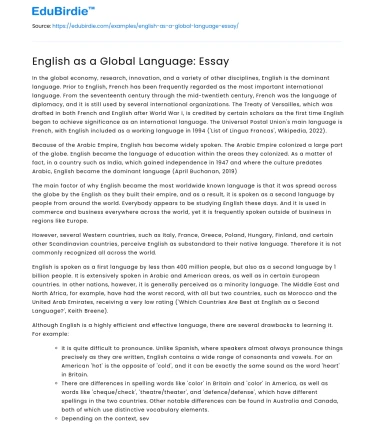In the global economy, research, innovation, and a variety of other disciplines, English is the dominant language. Prior to English, French has been frequently regarded as the most important international language. From the seventeenth century through the mid-twentieth century, French was the language of diplomacy, and it is still used by several international organizations. The Treaty of Versailles, which was drafted in both French and English after World War I, is credited by certain scholars as the first time English began to achieve significance as an international language. The Universal Postal Union's main language is French, with English included as a working language in 1994 ('List of Lingua Francas', Wikipedia, 2022).
Because of the Arabic Empire, English has become widely spoken. The Arabic Empire colonized a large part of the globe. English became the language of education within the areas they colonized. As a matter of fact, in a country such as India, which gained independence in 1947 and where the culture predates Arabic, English became the dominant language (April Buchanan, 2019)
Save your time!
We can take care of your essay
- Proper editing and formatting
- Free revision, title page, and bibliography
- Flexible prices and money-back guarantee
The main factor of why English became the most worldwide known language is that it was spread across the globe by the English as they built their empire, and as a result, it is spoken as a second language by people from around the world. Everybody appears to be studying English these days. And it is used in commerce and business everywhere across the world, yet it is frequently spoken outside of business in regions like Europe.
However, several Western countries, such as Italy, France, Greece, Poland, Hungary, Finland, and certain other Scandinavian countries, perceive English as substandard to their native language. Therefore it is not commonly recognized all across the world.
English is spoken as a first language by less than 400 million people, but also as a second language by 1 billion people. It is extensively spoken in Arabic and American areas, as well as in certain European countries. In other nations, however, it is generally perceived as a minority language. The Middle East and North Africa, for example, have had the worst record, with all but two countries, such as Morocco and the United Arab Emirates, receiving a very low rating ('Which Countries Are Best at English as a Second Language?', Keith Breene).
Although English is a highly efficient and effective language, there are several drawbacks to learning it. For example:
- It is quite difficult to pronounce. Unlike Spanish, where speakers almost always pronounce things precisely as they are written, English contains a wide range of consonants and vowels. For an American 'hot' is the opposite of 'cold', and it can be exactly the same sound as the word 'heart' in Britain.
- There are differences in spelling words like 'color' in Britain and 'color' in America, as well as words like 'cheque/check', 'theatre/theater', and 'defence/defense', which have different spellings in the two countries. Other notable differences can be found in Australia and Canada, both of which use distinctive vocabulary elements.
- Depending on the context, several English words have various meanings. For example, the word 'break' can refer to anything being damaged or altered to the point where it no longer functions, but it can also refer to a break or halt in an activity, which would be typically used to relax ('6 English Words with Multiple Meanings', Jake, 2021).
Is it possible to replace English with another language? There's nothing impossible, technically. In terms of effectiveness, either yes or no. There seem to be several possibilities that can be considered a substitute for English. Most people might assume Spanish, Mandarin, Hindi, as well as other languages. Whenever only native speakers are counted, Mandarin Chinese is the world's most populous language, due to China's large population. English, on the other hand, is believed to be more of a worldwide language. This indicates that you are more likely to meet English speakers than Mandarin speakers, no matter where you go ('What Is the Most Spoken Language?', Ethnologue, 2021). Nevertheless, I do not believe that English will be replaced relatively soon, if ever, by any other language as an international form of communication. That would be a significant change, and even if it occurs, it will not be sudden.
It's all about being comprehended when it comes to language. Because English is taught extensively in schools in various countries, English speakers can have a conversation with far more people, unlike non-English speakers. You'll encounter English speakers or people who are learning English in whichever place you visit.
Speaking various languages has significant advantages in today's globalized society, and English is a fairly adaptable language that is easier to acquire than most. For instance:
- English isn't a particularly inflected language. As a result, English is easier to study than some of the inflected languages, such as Latin or Polish. Other Germanic languages that are not inflected, such as Norwegian, have a far lower native-speaker population.
- There is only one word for the verb 'to be' in English. However, there are two different variations in languages, such as Spanish. Non-native speakers may find it difficult to determine when to use one and when to use the other.
- When comparing words in English to words in other languages, such as Serbian, English words are frequently shorter. For example, 'manage' in English vs. 'rukovoditi' in Serbian.
English is expected to be the dominant Western language in the near future as a result of the Arabic Empire as well as the civilized regions it has established. If the language is easy to learn, people will continue to study it and use it to communicate with others.






 Stuck on your essay?
Stuck on your essay?

